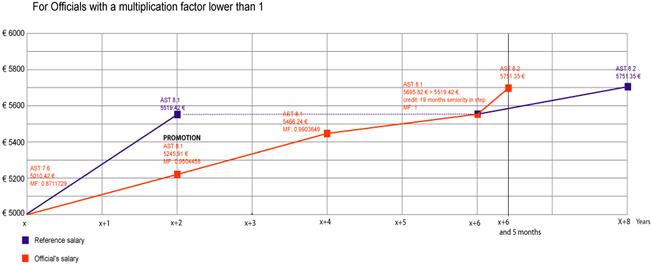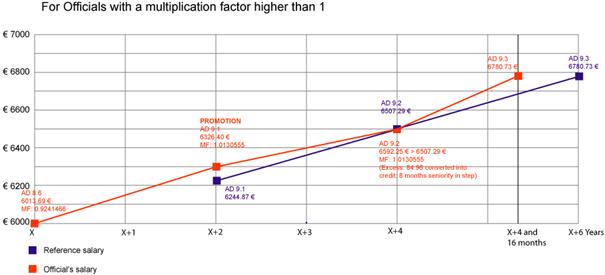|
TRANSITIONAL MEASURES TO BRING EXISTING BASIC SALARIES
INTO LINE WITH THE NEW PAY AND CAREER SCALES (MULTIPLICATION FACTOR)
The following information concerns those officials recruited
before 1st May 2004
The transitional measures provided for in the Staff Regulations to
bring existing basic salaries in line with the pay and career scale in
force since 1st May 2004 have lately given rise to a lot of queries.
Some staff members recruited before 1st May 2004, but promoted in 2005,
expected to advance in step pursuant to Article 44 of the Staff
Regulations, but then remained in the first step of their grade. Likewise,
others have seen their multiplication factor reduced to one and have
directly advanced to step 3, 4 or 5.
The purpose of this Administrative Notice is to explain how the pay of
staff recruited before the entry into force of the revised Staff
Regulations on 1st May 2004 will be progressively brought into line with
the new pay and career scales.
You can find a list with most frequently asked questions and answers at:
http://www.cc.cec/pers_admin/promotions/keyconcept_en.html#6
Why is there a Multiplication Factor?
The revised Staff Regulations created a new career system, moving from
categories A, B, C and D to the AD and AST function groups. As you know,
there has been a phased transition to the new career system. From 1st May
2006 all staff could see that their grades were renamed. The grade C*4
became for example AST 4, or the grade A*11 became AD 11.
This transition affects not just your grade, but also the pay scale by
which you are paid. If you look, on the upper left-hand side of your pay
slip, you will see that your 'multiplication factor' is indicated.
At the end of the transition period, which varies for each official, basic
salaries are brought into line with the new pay scale so that all
officials in the same grade and step will receive the same basic pay.
Your pay will therefore be progressively inserted into the new pay scale
(as provided for by Article 7(7) of Annex XIII on transitional measures of
the Staff Regulations).
These transitional measures initially served the purpose of ensuring that
your basic pay would not be reduced as a result of the entry into force of
the revised Staff Regulations on 1st May 2004 thanks to the multiplication
factor. Equally, they foresee that your basic pay will become at the end
of the transitional period equal to that provided for in the new pay
scale. Once this happens, your multiplication will be 1.
What is the Multiplication Factor?
On 1st May 2004, basic salaries remained unchanged, but were instead
calculated by reference to the new pay and career scale.
The multiplication factor, as calculated on 1st May 2004, expresses the
relationship between the salary you received on that date and the salary
provided for by the new salary grid ("reference salary").
What will change?
Until you are promoted for the first time under the revised Staff
Regulations (after 1st May 2004), your basic salary will remain below the
reference salary for your grade and step in the new salary grid.
When you are promoted, the relationship between your new basic salary
(based on the percentage increase you receive) and the reference salary
will change. You will have a new multiplication factor. Your basic salary
will now need to be brought into line with the reference salary. This will
be done in one of two ways:
For officials with a multiplication factor lower than 1
For the vast majority of staff whose basic salary is below the
reference salary provided for by the new scale after their first
promotion, you will receive automatic salary increases every two years
while remaining in the first step of that grade, until your basic salary
reaches the reference salary for that grade's first step. With each
two-yearly salary increase, the recalculated multiplication factor will
approach 1.0. Once that point is reached, you will continue to progress in
salary and in step.
| Example: |
You are promoted from AST 7, step 6.
Before promotion, your basic salary is € 5,010.42 (with a
multiplication factor of 0.8711729 in relation to the new pay scale).
Upon promotion to AST 8/1, you receive a salary increase of 4.7 %,
taking your new basic salary to € 5,245.91. A new multiplication
factor of 0.9504458 is applied to the reference salary of € 5519.42
for AST 8/1. Your basic salary will then rise incrementally every two
years until it corresponds to a multiplication factor of 1.0 for that
grade and step. During this period, you will receive salary increases
every two years, but will stay in the first step. |

Chart available as
 for a
better visualisation. for a
better visualisation.
For officials with a multiplication factor higher than 1
For another smaller group of officials, however, promotion under the new
career system will mean that their new basic salary is higher than
the reference salary, resulting in a multiplication factor greater than 1.
In order to ensure that at the end of the transitional period all staff in
the same grade and step receive the same basic pay, the multiplication
factor has to be reduced to one.
This approach has been adopted by all Community institutions. The goal is
to ensure that similar situations are not treated differently. If
officials benefit from a multiplication factor higher than one, a
relatively small group of officials would, without reason, receive a basic
salary higher than that of the majority of colleagues in the same grade
and step.
In order to avoid such a preferential treatment, two years after
promotion, on the occasion of the advancement in step, the part of your
multiplication factor which exceeds 1 will be converted into seniority in
the step. This could mean that you will advance directly to step 2, 3, 4
or 5, depending on the value of your base salary.
The information about your new seniority in the step is available to you
in your Sysper2 file under "Career history", index card
"Official/Temp.Ag.", section "History of grades".
Those of you promoted in the 2005 exercise and who have a new
multiplication factor higher than 1.0 have been informed by letter.
| Example: |
You are promoted from AD 8, step 6.
Before promotion, your basic salary is € 6013.69 (with a
multiplication factor of 0.9241466 in relation to the pay scale). Upon
promotion to AD 9/1, you receive a salary increase of 5.2 %, taking
your new basic salary to € 6326.40. This would mean that a new
multiplication factor of 1.0130555 is applied to the new reference
salary of € 6244.87.
Two years after promotion, in order to bring the situation into line
with the new salary grid and reduce the multiplication factor to 1.0,
an excess of € 84.96 would then be converted into 8 months seniority
in the step.
The amount to be converted into seniority (€ 84.96) is the difference
between the actual reference salary for AD 9/2 (€ 6507.29) and what
this reference salary would have been if the multiplication factor of
1.0130555 had been applied to it (i.e. € 6592.25). This means that you
will advance to the next step in 16 months instead of the standard 24
months. |

Chart
available as
 for a
better visualisation. for a
better visualisation.
Commitment by the Appointing Authority regarding
officials subject to a multiplication factor higher than 1
The Appointing Authority has received several complaints pursuant to
Article 90(2) of the Staff Regulations concerning the way in which the
Administration is applying the provisions of Article 7 of Annex XIII to
the Staff Regulations in situations where the multiplication factor has
become higher than one.
Namely:
-
The first promotion after the entry into force of the
revised Staff Regulations on 1 May 2004 leads to an increase in basic
monthly salary to be calculated on the basis of the table contained in
Article 7(5) of Annex XIII Staff Regulations;
-
This calculation gives rise to a multiplication factor
which is greater than one;
-
Pursuant to Article 7(7) of Annexe XIII Staff
Regulations, when two years after the first promotion the automatic
advancement in step takes place, that part of the multiplication factor
which is higher than one is converted into seniority in step, so that
the official is placed in step 2, 3, 4 or 5 of his grade, in certain
cases subject to an additional seniority in step.
Recently, the first appeal relating to this issue was
lodged before the Civil Service Tribunal (case F-22/07, L v Commission).
In order to avoid the proliferation of complaints and appeals, the
Appointing Authority will apply the interpretation of the provisions of
Article 7 of Annex XIII of the Staff Regulations by the Tribunal to all
officials with respect to whom the Administration has applied those
provisions in the manner described above, regardless of whether they have
or have not objected by lodging a complaint pursuant to Article 90(2) of
the Staff Regulations and/or an appeal to the Civil Service Tribunal. |

